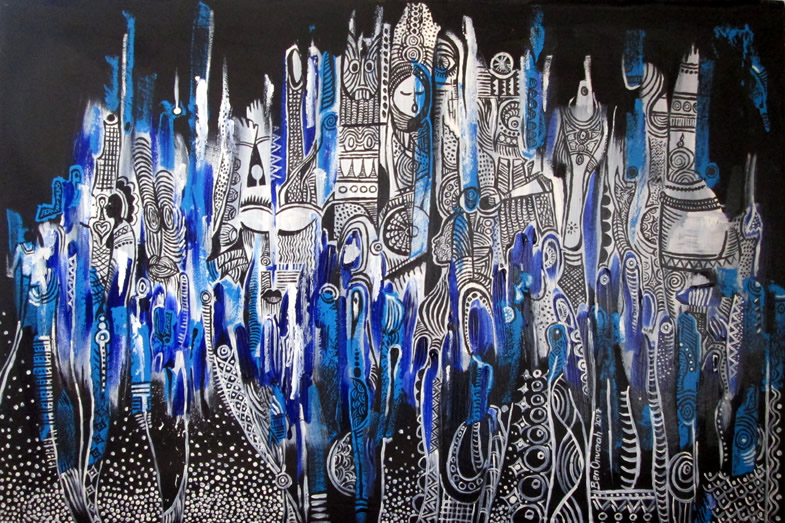Igbo People Migration and Identity

After the Nigeria/Biafra civil war which lasted from 1967 to 1970, (the war involved mostly Igbo-speaking people in the East of Nigeria who sought to break away from the country and form an independent nation of Biafra) the Igbo land was ransacked and the people were devastated and demoralised even till today, therefore giving birth to different agitating and Biafran separatist organizations such as Movement for the Actualization of Sovereign State of Biafra (MASSOB) and The Indigenous People of Biafra (IPOB). The reason is not far-fetched, According to Obi-Ani (2009), The issues that gave rise to Biafra are still very prevalent in Nigeria today: injustice, insecurity and ethnicity. Whether we look at Nigeria from the angle of states and local government creations, the perception of injustice to a section of the country (the Igbo) becomes obvious. Insecurity of lives and property is so glaring that it discourages foreign investment to the country. From religious cum ethnic convulsion in the Middle Belt, insurrection in the Niger Delta region over resource control to kidnapping “business” by miscreants in Igboland or the rising in the Northeast and Northwest by Boko Haram and politically motivated assassinations in the Southwest, Nigeria appears more insecure than previously is the case. The civil war was fought under the canopy of “one Nigeria”. Unfortunately, Nigerians are more conscious of their ethnic roots than being Nigerians. The federal character principle has made Nigerians less Nigeria and enthroned the cult of mediocrity. Every ethnic group makes inciteful comments on its marginalization and schemes for positions to get “fair” share of the “national cake” at the expense of the Nigerian entity. The economy wobbles in the face of serious infrastructural decay, industries, close shop, while the nation’s workforce idles away.
Apart from the transatlantic slave trade that saw an estimated total of 1.4 million Igbo people been transported to Barbados, Haiti, Jamaica and United States of America. The post-civil war experience have also forced the Igbos to migrate for the second time in large number to all parts of the world in seeking for not just greener pasture but for security, equality and fairness which is lacking in their home country Nigeria, coupled with the fact that Igbo people are known to be very enterprising traders and business people.
Research suggests that the Igbo of southeastern Nigeria are the most migratory among the 250 ethnic groups in Nigeria (NISER, 1997). As buying and selling or petty trading is said to be an integral part of Igbo culture, so is the habit of migrating from one area to another. Achebe (1983) captures Igbo migratory attitude thus, ‘Igbo culture being receptive to change, gave the Igbo man an unquestioned advantage over his compatriots in searching credentials for advancement in Nigeria’s colonial society. Unlike the Hausa-Fulani, he was unhindered by a wary religion and unlike the Yoruba, the Igbo man was unhampered by traditional hierarchies. This kind of creature fearing no god or man, was custom made to grasp the opportunities such as they were, of the white man’s dispensation...’. (Ojukwu, 2009)
Even within Nigeria, there was and still internal emigration of Igbos to other cities and towns with the country. According to Ajani, Oludele & Onodje, Onah. (2016) the historical trend of migration of the Igbo people to Ibadan can be traced to the Nigerian civil war. Many Igbo emigrated out of the traditional Igbo homeland in the south eastern Nigeria due to an absence of federal presence, lack of jobs and poor infrastructure. The Igbo moved to such Nigerian cities as Lagos, Ibadan and Abuja. The majority of Igbo internal migrants are traders who leave the south-eastern part of Nigeria to other parts of the country to engage in business ventures, involving petty trading and importation of goods (Axel, 2006). This consistent internal migratory behaviour of the Igbo may invariably create a variation in their cultural identity.
Bibliography
Ajani, Oludele & Onodje, Onah. (2016). Migration and Cultural Identity Retention of Igbo Migrants in Ibadan, Nigeria. Journal of Sustainable Development. 9. 137. 10.5539/jsd.v9n2p137.
Obi-Ani, Paul. (2009). Post-Civil War Political and Economic Reconstruction of Igboland, 1970-1983. 10.13140/RG.2.1.4101.3846.
Ojukwu, C. (2009), Globalization, migration and the philosophy of in-ward looking: The contemporary Igbo nation in perspective. African Journal of Political Science and International Relations Vol. 3 (3), pp. 084-091
